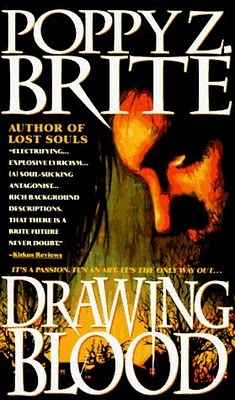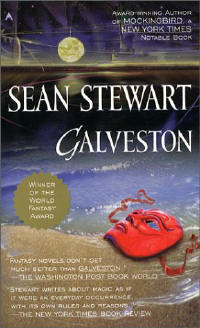This is the sixth interview and the eighth post in my series on inclusivity and exclusivity in fiction. You can find a full list of other posts so far at the end of this piece.
In today’s post, we get to finish the discussion we started some time back with writer Leah Bobet.
 LUC: In our first round of questions, you mentioned Poppy Z. Brite’s book Drawing Blood, saying “Besides all the vampire sex and killing, what I took from that was that gay people are just people with relationships and problems and to do lists and lives to run and stories,” and you went on to describe how that has affected how you see and understand many kinds of people in the world. Are you consciously trying to create “aha” moments like this for your own readers? Are your goals for inclusivity in your writing explicit and specific?
LUC: In our first round of questions, you mentioned Poppy Z. Brite’s book Drawing Blood, saying “Besides all the vampire sex and killing, what I took from that was that gay people are just people with relationships and problems and to do lists and lives to run and stories,” and you went on to describe how that has affected how you see and understand many kinds of people in the world. Are you consciously trying to create “aha” moments like this for your own readers? Are your goals for inclusivity in your writing explicit and specific?
LEAH: I’m not, no – and I’m not sure if one deliberately can create that moment. Every reader’s set of experiences and stories and, well, their brains are different. The “aha” moment is when the story being told combines with the rest of your life and data and experiences in a way that tips over a realization you’ve been on the verge of making. It’s so very rooted in the reader that I’m not sure crafting it is possible.
What you can do, I think, is present the world as you see it, or the questions you’re sitting up nights asking yourself. And people will either agree or disagree with what you show them, or go off asking all new questions that you never could have predicted.
As for goals for inclusivity, mostly the goal for me is to have it — which could be read as extremely explicit and specific, or not at all! But to be clearer: I don’t write to a moral point, or to proselytize in any way. It didn’t take more than five minutes’ experience as an editor to learn that there’s a difference between a story and a piece written To Make A Point ™, and that the latter is very difficult to make into an interesting or engaging read.
What I do try to write is the kinds of stories I want to read as a reader, and those are stories that challenge me; stories that can both sweep up my heart and make me really and truly think; stories that examine social values without trying to sell them to the reader. The stories I write are populated by all kinds of people because I want to read stories like that, and because that’s the world on my block, in my neighbourhood, in my city.
LUC: When a writer tackles a story that includes someone from a group they’re not a part of, what tests or steps or touchstones should be used, in your opinion, to do the job right?
LEAH: Youch – I am not at all qualified in any fashion to say how one can do the job right. You can do all sorts of recommended things and still drop the ball on this sort of thing, or do none of them and do a really productive job. It’s all situational, and it depends, also, on what job you’re trying to do.
I think there are two main factors to look at when you’re writing characters from a marginalized group, however you choose to tackle them. The first: What’s the existing social and literary conversation around how that group is portrayed? What are the in-person stereotypes about them, and what are the fiction stereotypes? Because even if you’re not aware of or writing out of that stereotype, literature’s a conversation, and your comment (to stretch that metaphor!) will be taken as part of the larger conversation. If it’s just reinforcing that, or not acknowledging in certain ways that there is a conversation going on, then it’s very easy to do harm.
I’ve tripped on that one myself: Thinking I knew the ground around how a minority is treated in fiction, and not in fact knowing it at all. That particular piece of work hurt readers, and I can tell you unambiguously that causing harm with your work – using the trust a reader grants you carelessly, or using it ill – is a horrible feeling. It’s not one I personally care to repeat.
The second factor? Remember that your characters are people.
This sounds small, but it’s actually pretty big. Remembering someone’s a person can mean remembering that someone from group X will have things that make them laugh and cry and roll their eyes just like someone from group Y will. It can mean that they’ll be more or less attached to the culture and religion and society they grew up in, or in different ways, depending on their personality and experiences. It can mean looking at their reactions as not something opaque and Other and strange, but as reactions to people around them being kind or cruel, or what has been expected of them, or what success and failure were laid out to mean when they were young. It also means that they have a personality, and that there isn’t a standard, textbook way for people of group X to react to those things: anyone who’s ever had an argument with their siblings can pretty much back that one up.
In short, you are writing a human being. Treat them as such: as someone complete.
This means, a lot of the time, learning not just to watch, and to see, but to empathize. Which doesn’t mean to feel bad for someone; it means to, to the best of your ability, shift your own perspective. What might your street look like to someone with mobility issues? What would a character who grew up on a farm notice when they walk into a city park, and what would one who grew up in Manhattan notice?
This isn’t just a tool for writing characters different than you; it’s a tool for writing any characters well. And it’s a tool that ends up bleeding, like all the best ones do, into your life: Because real people are complete and complex humans too, and once you’ve gotten into practice in taking other perspectives and not assuming your own is the only perspective? You’re seeing people. And that will reflect in your interactions; in how you treat your neighbours in the small things; and in how they notice, and treat you in return.
LUC: We’ve talked a little about Drawing Blood. Are there other books or stories that, for you, stand out in this regard? If so, what did they do right?
 LEAH: Actually, this might appear to come a bit out of left field? But: Anything by Sean Stewart. Specifically Galveston, or Nobody’s Son.
LEAH: Actually, this might appear to come a bit out of left field? But: Anything by Sean Stewart. Specifically Galveston, or Nobody’s Son.
If you subscribe to the theory that every author has a couple themes or problems they keep returning to, picking at around the edges, then one of Stewart’s is about realizing that you’re actually a complete asshole, and then what you do after that realization hits. This is useful to everyone, I think, because I have not yet met a person of any identity makeup who hasn’t been an asshole to somebody. In activism or just in daily living, the skill of what you do after you’ve been hurtful to someone else is a very useful one to practice, no matter who you are. They’re flawed books about flawed people, and I’m not put off by either the books or the protagonists being flawed, because they’re also clear-eyed and kind.
So, what did those books do right for me, as a reader? Aside from being quite well-made in a lot of ways – Stewart has a real skill with subtlety and nuance, especially when it comes to his characterization – the thing that affected me about them was that they’re so non-judgmental. They let you in close to people who are wounded and recognize those wounds as valid and real, and then show how the behaviour that woundedness causes hurts other people, and how that pain is valid, too. And I think that’s the key: That pain is valid too, not instead. There’s an immense compassion in recognizing that we’re all capable of simultaneously being the people dealing the hurt and receiving it, or acting out of old hurt while acting well or badly. Rendering that into fiction is a very tricky thing – almost as tricky as practising that kind of compassion in life. And it’s just as worthwhile, I think.
Leah Bobet is the author of Above, a young adult urban fantasy novel (Arthur A. Levine/Scholastic, 2012), and an urbanist, linguist, bookseller, and activist. She is the editor and publisher of Ideomancer Speculative Fiction, a resident editor at the Online Writing Workshop for Science Fiction, Fantasy, and Horror, and a contributor to speculative web serial Shadow Unit.
She is also the author of a wide range of short fiction, which has been reprinted in several Year’s Best anthologies. Her poetry has been nominated for the Rhysling and Pushcart Prizes, and she is the recipient of the 2003 Lydia Langstaff Memorial Prize. Between all that she knits, collects fabulous hats, and contributes in the fields of food security and urban agriculture. Anything else she’s not plausibly denying can be found at leahbobet.com.
- 7/27 – interview with Leah Bobet
- 7/29 - Where Are the Female Villains?
- 8/3 – interview with Vylar Kaftan
- 8/9 - Concerns and Obstacles (multiple mini-interviews)
- 8/10 – James Beamon on Elf-Bashing
- 8/17 – Steve Bein on Alterity
- 8/24 – Anaea Lay on “An Element of Excitement”



